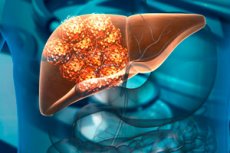New publications
New drug activates immune system against liver cancer by suppressing fat metabolism
Last reviewed: 03.08.2025

All iLive content is medically reviewed or fact checked to ensure as much factual accuracy as possible.
We have strict sourcing guidelines and only link to reputable media sites, academic research institutions and, whenever possible, medically peer reviewed studies. Note that the numbers in parentheses ([1], [2], etc.) are clickable links to these studies.
If you feel that any of our content is inaccurate, out-of-date, or otherwise questionable, please select it and press Ctrl + Enter.

Liver cancer cells thrive on fat, posing a serious threat to the millions of people who suffer from fatty liver disease. But researchers at McMaster University, in collaboration with Espervita Therapeutics, have developed a promising new treatment that helps the immune system attack and destroy these tumours.
The discovery, described in a study published in the journal Nature, opens up new possibilities for slowing tumor growth and activating the body’s natural defenses. This is especially important because current treatments for liver cancer are ineffective: fewer than one in five patients survive more than five years after diagnosis.
"This is one of the first studies to show that targeting metabolism in tumours can enable the immune system to kill liver cancer cells, and opens the way to more effective strategies for preventing and treating this deadly disease," said Professor Gregory Steinberg, co-director of the Centre for Metabolism, Obesity and Diabetes Research at McMaster University and senior author of the study.
The scientists focused on an enzyme called ATP citrate lyase (ACLY), which plays a key role in converting sugar into fat, and developed a drug that inhibits (or "turns off") this enzyme selectively in the liver.
The results were encouraging: the tumors were found and destroyed. Even more exciting for the researchers was the unexpected discovery that the immune response was not driven by the well-known cancer-fighting T cells, but by their lesser-known cousins, the B cells.
“While T cells are well known for their role in fighting cancer, the contribution of B cells has been less understood until now. Our findings highlight a new and previously underappreciated link between tumor metabolism and B cell-mediated anti-tumor immune response,” says Jaya Gautam, lead author and research fellow in the Department of Medicine at McMaster University.
Fatty liver disease, formally known as metabolic-associated steatotic liver disease (MASLD), affects about eight million Canadians. Of these, 20% will develop metabolic-associated steatohepatitis (MASH), a more severe form of fatty liver disease that significantly increases the risk of liver cancer.
The drug that inhibits the ACLY enzyme is called EVT0185 and was given to MASH mice with liver cancer. The mice that received the drug had fewer tumors and were more vulnerable to attack by immune cells, especially B cells.
The researchers note that more research is needed to better understand how blocking ACLY in tumors enhances the immune system's response, and whether a similar B-cell-driven response might occur in people and other types of cancer.
